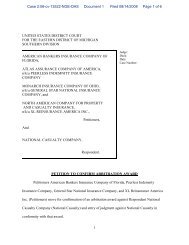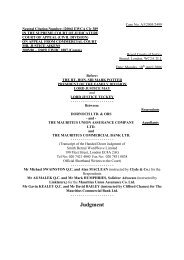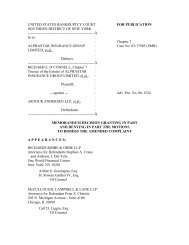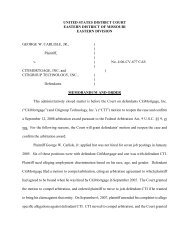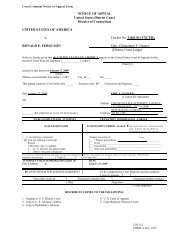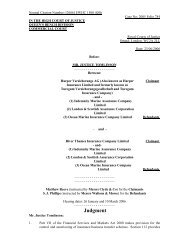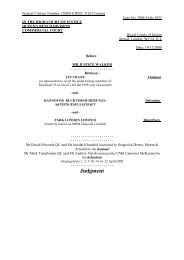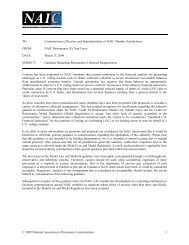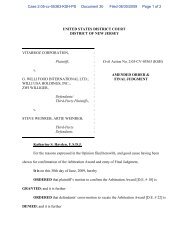Statutory Issue Paper No62R - Reinsurance Focus
Statutory Issue Paper No62R - Reinsurance Focus
Statutory Issue Paper No62R - Reinsurance Focus
You also want an ePaper? Increase the reach of your titles
YUMPU automatically turns print PDFs into web optimized ePapers that Google loves.
Property and Casualty <strong>Reinsurance</strong><br />
SSAP No. 62R<br />
c. The agreement shall constitute the entire contract between the parties and must provide<br />
no guarantee of profit, directly or indirectly, from the reinsurer to the ceding entity or<br />
from the ceding entity to the reinsurer;<br />
d. The agreement must provide for reports of premiums and losses, and payment of losses,<br />
no less frequently than on a quarterly basis, unless there is no activity during the period.<br />
The report of premiums and losses shall set forth the ceding entity’s total loss and loss<br />
expense reserves on the policy obligations subject to the agreement, so that the respective<br />
obligations of the ceding entity and reinsurer will be recorded and reported on a basis<br />
consistent with this statement; and<br />
e. With respect to retroactive reinsurance agreements, the following additional conditions<br />
apply:<br />
i. The consideration to be paid by the ceding entity for the retroactive reinsurance<br />
must be a sum certain stated in the agreement;<br />
ii.<br />
iii.<br />
iv.<br />
Direct or indirect compensation to the ceding entity or reinsurer is prohibited;<br />
Any provision for subsequent adjustment on the basis of actual experience in<br />
regard to policy obligations transferred, or on the basis of any other formula, is<br />
prohibited in connection with a retroactive reinsurance transaction, except that<br />
provision may be made for the ceding entity’s participation in the reinsurer’s<br />
ultimate profit, if any, under the agreement;<br />
A retroactive reinsurance agreement shall not be canceled or rescinded without<br />
the approval of the commissioner of the domiciliary state of the ceding entity.<br />
<strong>Reinsurance</strong> Agreements with Multiple Cedents<br />
9. <strong>Reinsurance</strong> agreements with multiple cedents require allocation agreements. The allocation<br />
agreement can be part of the reinsurance agreement or a separate agreement. If the agreement has<br />
multiple cedents:<br />
a. The allocation must be in writing and<br />
b. The terms of the allocation agreement must be fair and equitable.<br />
<strong>Reinsurance</strong> Contracts Must Include Transfer of Risk<br />
10. The essential ingredient of a reinsurance contract is the transfer of risk. The essential element of<br />
every true reinsurance agreement is the undertaking by the reinsurer to indemnify the ceding entity, i.e.,<br />
reinsured entity, not only in form but in fact, against loss or liability by reason of the original insurance.<br />
Unless the agreement contains this essential element of risk transfer, no credit shall be recorded.<br />
11. Insurance risk involves uncertainties about both (a) the ultimate amount of net cash flows from<br />
premiums, commissions, claims, and claims settlement expenses (underwriting risk) and (b) the timing of<br />
the receipt and payment of those cash flows (timing risk). Actual or imputed investment returns are not an<br />
element of insurance risk. Insurance risk is fortuitous—the possibility of adverse events occurring is<br />
outside the control of the insured.<br />
© 2009 National Association of Insurance Commissioners 62-5


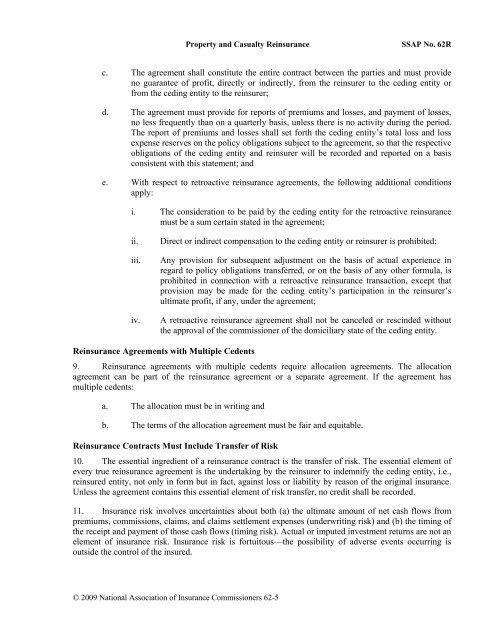
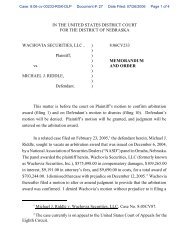
![202 Folio No 734 Neutral Citation Number: [2006] EWHC 1345 (QB ...](https://img.yumpu.com/50015000/1/184x260/202-folio-no-734-neutral-citation-number-2006-ewhc-1345-qb-.jpg?quality=85)
